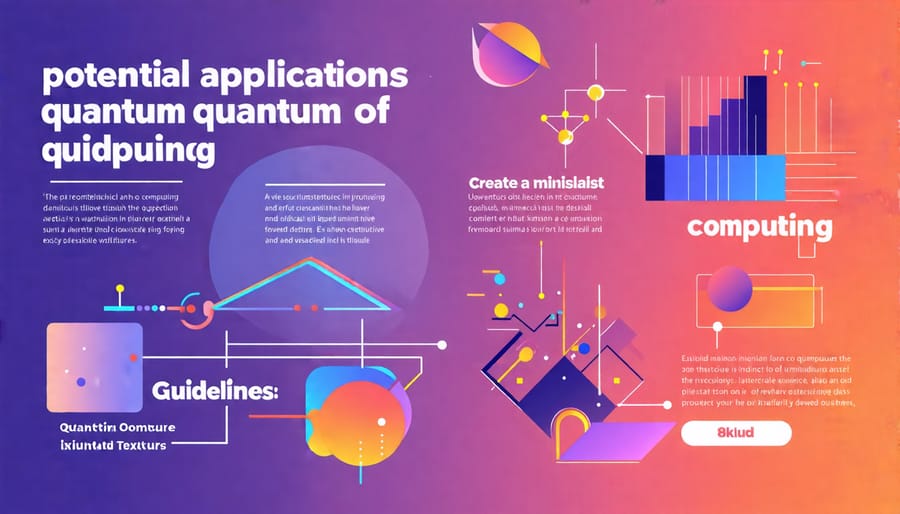Imagine a world where computers harness the mind-bending principles of quantum mechanics to solve problems that are intractable for classical machines. This is the tantalizing promise of quantum computing — a revolutionary technology that could transform fields from cryptography to drug discovery to artificial intelligence.
While still in its infancy, quantum computing has made remarkable strides in recent years. Tech giants and startups alike are racing to build ever more powerful quantum processors, inching us closer to the elusive “quantum advantage” — the point at which these exotic machines outperform their classical counterparts.
As quantum computers scale up, they could soon tackle challenges like simulating complex chemical reactions, optimizing supply chains, and cracking the toughest encryption codes. Yet formidable obstacles remain, from taming the fragile nature of qubits to designing algorithms that unlock the full potential of quantum hardware.
Despite the hurdles, the future of quantum computing looks bright. With sustained progress in hardware, software, and theory, these extraordinary machines could one day reshape the foundations of computation itself. As we stand on the cusp of a quantum revolution, the only question is: Are we ready?
Current State of Quantum Computing


Quantum Supremacy
The concept of quantum supremacy represents a significant milestone in the development of quantum computing. It refers to the point at which a quantum computer can solve a problem that is practically impossible for classical computers to solve in a reasonable amount of time. This breakthrough demonstrates the immense potential of quantum computing and its ability to tackle complex computational challenges.
In 2019, Google made headlines by announcing that their quantum processor, Sycamore, had achieved quantum supremacy. The processor completed a task in just 200 seconds that would have taken the world’s most powerful classical supercomputer thousands of years to accomplish. This feat showcased the exponential speed-up that quantum computers can provide over their classical counterparts.
The achievement of quantum supremacy marks a crucial step forward in the field of quantum computing. It validates the theoretical foundations and demonstrates that quantum computers can indeed outperform classical machines in certain tasks. This milestone has sparked further research and investment in quantum technologies, as scientists and industry leaders recognize the immense potential of harnessing the power of quantum mechanics for computation.
As quantum computing continues to advance, the realization of quantum supremacy opens up new possibilities for solving complex problems in fields such as cryptography, drug discovery, optimization, and machine learning. It paves the way for the development of practical quantum applications that can revolutionize various industries and drive scientific breakthroughs in the coming years.
Challenges and Limitations
Despite the remarkable progress in quantum computing, several significant challenges and limitations must be addressed before widespread adoption can occur. One of the primary hurdles is maintaining coherence, or the fragile quantum state, for extended periods. Quantum bits (qubits) are highly sensitive to external disturbances, leading to errors and loss of information. Researchers are exploring advanced error correction techniques and more stable qubit designs to mitigate this issue.
Scalability poses another challenge, as current quantum computers operate with a limited number of qubits. To tackle complex real-world problems, quantum systems must scale up to thousands or even millions of qubits. This requires not only advancements in hardware but also in software and algorithms that can efficiently manage and manipulate large qubit arrays.
Furthermore, developing user-friendly interfaces and integrating quantum computers with classical systems remain crucial for wider adoption. Researchers are working on creating hybrid quantum-classical architectures and improving the accessibility of quantum computing resources through cloud platforms.
As Alán Aspuru-Guzik, a leading quantum computing expert, states, “We are in the early days of quantum computing, analogous to the 1950s of classical computing. While we have made significant strides, there is still a long road ahead to unlock the full potential of this transformative technology.”
Potential Applications

Scientific Breakthroughs
Quantum computing holds immense promise for accelerating scientific breakthroughs across various disciplines. In materials science, quantum simulations could revolutionize the discovery of novel materials with unprecedented properties. For instance, researchers at the University of Chicago are harnessing quantum algorithms to design more efficient solar cells and batteries. As Dr. David Awschalom, a pioneer in quantum research, explains, “Quantum computing allows us to simulate complex molecular systems that are beyond the reach of classical computers, opening up new possibilities for materials design.”
Quantum chemistry is another field poised for significant advancements. By accurately modeling chemical reactions at the quantum level, researchers can develop more effective drugs, catalysts, and sustainable energy solutions. Harvard University’s Alán Aspuru-Guzik and his team are using quantum computers to explore the vast chemical space, potentially leading to the discovery of life-saving medications and eco-friendly materials.
In particle physics, quantum computing could help unravel the mysteries of the universe. Scientists at CERN are investigating how quantum algorithms can enhance the analysis of massive datasets generated by the Large Hadron Collider. By processing this data more efficiently, researchers may uncover new insights into the fundamental nature of matter and energy, paving the way for groundbreaking discoveries in our understanding of the cosmos.
Cryptography and Cybersecurity
Quantum computing poses a significant challenge to traditional cryptography, as quantum computers have the potential to break many of the encryption methods currently in use. With their ability to perform complex calculations exponentially faster than classical computers, quantum computers could render common encryption algorithms, such as RSA and elliptic curve cryptography, vulnerable to attacks. This has far-reaching implications for cybersecurity, as it could compromise the security of sensitive data, financial transactions, and personal information.
To address this threat, researchers are actively working on developing quantum-resistant encryption methods, also known as post-quantum cryptography. These new encryption algorithms are designed to withstand attacks from both classical and quantum computers, ensuring the continued security of our digital systems. The National Institute of Standards and Technology (NIST) is leading the effort to standardize post-quantum cryptography, with several promising candidates currently under consideration.
As Dr. Michele Mosca, co-founder of the Institute for Quantum Computing at the University of Waterloo, states, “We need to be proactive in developing and deploying quantum-resistant cryptography to protect our critical infrastructure and sensitive data from the potential threat of quantum computing.” The development of post-quantum cryptography is crucial to maintaining the integrity and confidentiality of our digital world in the face of advancing quantum technologies.
Artificial Intelligence and Machine Learning
The advent of quantum computing holds immense potential for revolutionizing Artificial Intelligence and machine learning. By harnessing the principles of quantum mechanics, quantum computers can perform complex calculations exponentially faster than classical computers. This quantum leap in computational power could enable AI algorithms to tackle problems that are currently intractable.
One area where quantum computing could make a significant impact is pattern recognition. Quantum algorithms, such as Grover’s search algorithm, can efficiently sift through vast amounts of data to identify patterns and anomalies. This capability could lead to breakthroughs in image and speech recognition, as well as in the analysis of complex datasets in fields like genomics and astrophysics.
Optimization is another domain where quantum computing could shine. Many real-world problems, such as supply chain optimization and drug discovery, involve finding the best solution among a myriad of possibilities. Quantum algorithms, like the quantum approximate optimization algorithm (QAOA), can explore these vast solution spaces much more efficiently than classical algorithms.
Furthermore, quantum computing could enhance natural language processing (NLP) by enabling more sophisticated language models. Quantum NLP algorithms could better capture the nuances and context of human language, leading to more accurate machine translation, sentiment analysis, and question-answering systems.
As quantum computing continues to advance, its integration with AI and machine learning will likely unlock new frontiers in intelligent systems, pushing the boundaries of what is possible in fields ranging from healthcare to finance to space exploration.
Quantum Computing Ecosystem
The quantum computing ecosystem is rapidly expanding, with a diverse array of stakeholders contributing to its growth and development. Research institutions, startups, and major tech companies are all investing heavily in this transformative technology, recognizing its immense potential to revolutionize various industries and solve complex problems.
Universities and research centers around the world are at the forefront of quantum computing research, pushing the boundaries of what is possible and laying the foundation for future innovations. From developing new algorithms and error correction techniques to exploring novel materials and hardware architectures, these institutions are driving the fundamental science behind quantum computing.
Startups are also playing a crucial role in the quantum computing ecosystem, bringing fresh ideas and agile approaches to the field. These companies are often spinoffs from academic research groups or founded by experienced industry professionals who see the commercial potential of quantum computing. They are working on developing practical applications, building user-friendly software tools, and creating specialized hardware components to make quantum computing more accessible and cost-effective.
Meanwhile, tech giants like Google, IBM, Microsoft, and Amazon are investing billions of dollars in quantum computing research and development. They are building their own quantum hardware, creating cloud-based quantum computing platforms, and partnering with research institutions and startups to accelerate progress. These companies recognize that quantum computing could give them a significant competitive advantage in areas like drug discovery, financial modeling, and logistics optimization.
Collaborations and partnerships are a hallmark of the quantum computing ecosystem, with stakeholders working together to overcome technical challenges and create a thriving industry. For example, the IBM Q Network brings together Fortune 500 companies, startups, and research institutions to explore practical applications of quantum computing. Similarly, the Microsoft Quantum Network connects researchers, developers, and businesses to advance quantum computing software and tools.
As the quantum computing ecosystem continues to grow and mature, we can expect to see even more exciting innovations and breakthroughs in the years ahead. With sustained investment, collaboration, and a shared vision for the future, quantum computing has the potential to transform our world in ways we can only begin to imagine.
Challenges and Future Outlook
Despite the immense potential of quantum computing, several challenges must be overcome to realize its full capabilities. One of the most significant hurdles is maintaining the delicate quantum states of qubits, which are prone to errors caused by external disturbances and internal instabilities. Researchers are working on developing more robust error correction techniques and improving the stability of quantum systems to address this issue.
Another challenge is the scalability of quantum computers. Current quantum devices have a limited number of qubits, restricting their computational power. To tackle complex real-world problems, quantum computers with hundreds or even thousands of qubits are needed. Scientists are exploring new materials, such as topological qubits, and innovative architectures to build larger, more reliable quantum systems.
The development of quantum algorithms and software also requires significant attention. While some quantum algorithms have been proposed, there is still a need for more efficient and practical algorithms tailored to specific applications. Furthermore, creating user-friendly software tools and interfaces is crucial to make quantum computing accessible to a wider range of users.
Despite these challenges, the future outlook for quantum computing remains promising. Governments, academic institutions, and private companies are heavily investing in quantum research and development. Tech giants like Google, IBM, and Microsoft are racing to build more powerful quantum computers and offer cloud-based quantum computing services. As quantum hardware continues to improve and more sophisticated algorithms are developed, we can expect to see quantum computers tackling increasingly complex problems in various fields.
Moreover, the integration of quantum computing with other emerging technologies, such as artificial intelligence and machine learning, holds immense potential. Quantum-enhanced machine learning algorithms could revolutionize data analysis, pattern recognition, and optimization tasks. As the field progresses, we may witness groundbreaking discoveries and transformative applications that are currently beyond our imagination.
In conclusion, while quantum computing faces significant challenges, the future outlook is filled with excitement and promise. As researchers and engineers work to overcome the obstacles and harness the full potential of quantum systems, we can anticipate a new era of computing that will reshape our understanding of the world and drive scientific and technological advancements in the coming decades.

